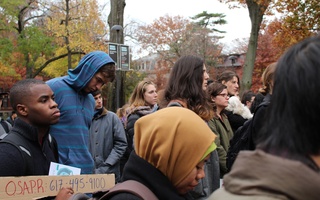Undergraduate leaders of Our Harvard Can Do Better, an anti-sexual assault advocacy group, are criticizing the “Frequently Asked Questions” document administrators released to clarify Harvard’s sexual harassment policies, arguing that it contains language that is opaque and inaccessible to students.
Last week, administrators released the supplementary document in the wake of results from the University’s sexual conduct climate survey, which showed that students overwhelmingly had little knowledge of and trust in Harvard’s response to sexual assault on campus. Administrators designed the supplementary document to clarify the University’s policies after a federal probe found Harvard Law School in violation of anti-sex discrimination law Title IX last year.
Law School professors, many of whom oppose Harvard’s policies, offered praise in response to the document’s release. But undergraduates in Our Harvard Can Do Better, a group whose members have been among the most vocal student critics of Harvard’s handling of campus sexual assault, said the document offers little clarification. {shortcode-f036bc6a6730ae6582a5b45ef45878f09215b75a}
The frequently asked questions and answers are “totally inaccessible,” said Jessica R. Fournier ’17, an organizer for Our Harvard Can Do Better. “This is not written or formatted in a way that makes it easy for students to understand, or even really possible for students to understand in a quick way,” she said.
In an interview last week, University Title IX Officer Mia Karvonides said the document clarified, among other points, the policy’s protections for freedom of speech in the classroom and the difference between the states of incapacitation and intoxication and when individuals can consent to sexual activity. The document also stipulated that students may turn to lawyers as personal advisers throughout the case investigation process, and that case appeals go to a body of faculty and senior administrators.
Fournier said some questions do clarify points of confusion in the policy, and she praised the document for specifying that complainants and respondents will not be asked to face each other during a case.
Still, she said that many answers contain legalistic language, which she argued may not be accessible to students. Specifically, she said, the document’s mention of the “reasonable person” standard used by case investigators to assess whether sexual harassment occurred may not be clear to undergraduate readers.
Fournier also argued that the document—despite clarifying that students may consent to sexual activity while intoxicated, but not incapacitated, under Harvard’s policy—did not adequately define the difference between the two states. She also criticized the document’s use of the words “objective” and “subjective” to describe factors for determining whether sexual conduct is welcome or unwelcome without giving specific examples.
“Being a lawyer should not be a prerequisite to being safe on your campus or to be able to understand what your rights are and how this University is going to protect you,” Fournier said.
The student advocates also criticized what they said was a lack of student involvement in the FAQ document’s drafting. Emily M. Fox-Penner ’17 argued that unlike when administrators published a brochure further detailing the policy last semester, students were not adequately consulted this time.
Karvonides said last week that administrators did not speak to students about the document’s exact phrasing prior to creating it, but they did send the materials pre-publication to student leaders for feedback.
Our Harvard Can Do Better, which filed a complaint prompting an ongoing federal investigation into the College’s Title IX compliance last year, will still push administrators to clarify the policies, according to Fournier and Fox-Penner.
The group is also in the process of responding to the sexual conduct climate survey results, which were released late last month, by soliciting additional feedback from students. Last month, they hosted a private town hall discussion.
Fournier added that Our Harvard Can Do Better will continue to argue for increased mandatory Title IX training for students. She argued that sexual assault survey results, which showed deficits in undergraduate knowledge about training, a need for increased programming.
“This is a moment where there could potentially be a lot of support for that,” Fournier said.
—Staff writer Noah J. Delwiche can be reached at noah.delwiche@thecrimson.com. Follow him on Twitter @ndelwiche.
Read more in College News
Activist Jennicet Gutiérrez Discusses BGLTQ Immigrant RightsRecommended Articles
-
 Posters About Sexual Assault Crop Up in Sever
Posters About Sexual Assault Crop Up in Sever -
 In New York, Law School's Jeannie Suk Debates Title IX
In New York, Law School's Jeannie Suk Debates Title IX -
Small StepsThe announcement comes as a victory for those who have criticized Harvard for a lack of confidential counseling services for survivors of sexual assault.
-
 Our Harvard Can Do Better Outlines Goals For Semester
Our Harvard Can Do Better Outlines Goals For Semester -
Student-Only Group Will Provide ‘Unfettered’ Input on College Sexual Assault PreventionFulfilling a longtime wish, a committee composed solely of undergraduates has begun meeting to provide “unfettered” input for administrators as the College seeks to implement sexual assault prevention measures.













